A few years ago, a friend came to Thailand on his dream trip to Southeast Asia. Like most tourists on their first trip to the land of smiles, he didn’t have a clue about the culture of Thailand. He is a very friendly guy, and he was in a great mood since he was on vacation. So while he traveled and enjoyed this beautiful country and its exquisite food, wherever he went, he kept greeting enthusiastically everyone he met on the way, intending to get closer to the customs of Thailand, with this expression:
‘Khop khun kha!‘
‘Hey, wait a second’, I said. ‘These words mean thank you‘. Unknowingly, he had been thanking everyone he met. In response, people would smile at him, nodding their heads … sometimes with a warm “khop khun khrap/kha.” And maybe Thais smiled as well because he was using the respectful word ‘kha‘ at the end of the sentence, which is habitually only used by females and transgenders, instead of ‘khrap‘, used by males.
And of course, the reason for this misunderstanding was that he often heard that phrase in restaurants, markets and many other corners of the kingdom of Thailand, and he wrongly assumed that it was the local greeting according to the culture of Thailand.
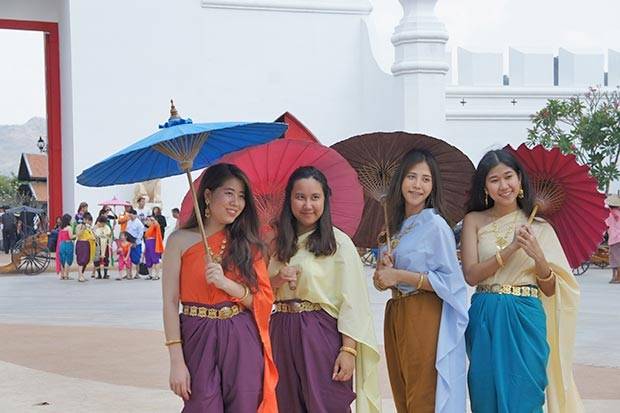
Popular wisdom tells us “wherever you go, do what you see”, and to some extent it is a good advice. But, along with this, it is always good to try to understand what lies underneath what we see, in order to understand it and apply it correctly.
One of the ways to get into the customs of Thailand is to learn a few basic words and phrases. Thais will really appreciate it if you try to express yourself in the local language, even if you can only say a few words with a terrible accent. It is also good to know some aspects of the local culture, the underlying customs that guide people’s behavior, so that you can better adapt to the environment and avoid unknowingly disturbing or offending anyone. This can even save you from certain penalties and bad times.
Therefore, below I will share some Thai customs so that you can avoid some common misunderstandings like what happened to my friend.
Here you can find:
Culture of Thailand: basic words that will be useful to you
How to greet in Thailand
Unlike in western countries, where people greet each other by shaking hands, hugging or kissing on the cheek, in Thailand greeting does not involve any kind of physical contact.
The most usual greeting in Thailand consists of making a slight bow (more pronounced if the person is much older) and brining palms together at chest level (actually the hands height is much more complicated, but chest level will suffice), saying:
- Men: sawaat dee khrap
- Women: sawaat dee kha
The ending khrap (used by men) and kha (used by women) is a particle with no definite meaning that adds a cordial and respectful tone to the sentence.
‘Sawaat dii khrap‘ or ‘sawaat dii kha‘ is equivalent to saying ‘hello’.
Sometimes they will shake your hand when they see that you are a foreigner. But there are no hugs or kisses in the greeting.
You can pronounce the same phrase when you want to say goodbye. So you can just say “sawaat dii krap” or “sawaat dii ka” to say “goodbye”.
🙏 Thanks
Gratitude is a universal virtue that will be appreciated wherever you. To express it in Thailand, with its customs and traditions, you just have to say:
- Men: kawp khun krap!
- Women: kawp khun ka!
Knowing and trying to use some local words will open local peolple’s minds, but I assure you that if you manage to show gratitude and warmth, you will also open their hearts and get an even friendlier attitude towards you.
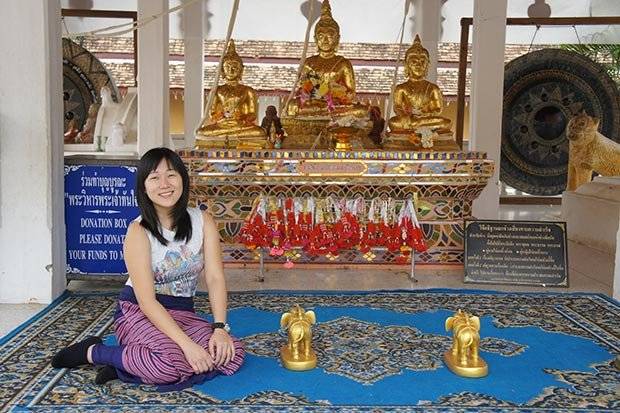
Knowing how to say ‘I don’t speak Thai’
‘I can’t speak (language)’ is a phrase that comes handy quite often when traveling abroad. It can get you out of misunderstandings and even trouble, in case someone wrongly assumes that you are understanding him/her. In Thai you can say:
- Men: phom phuut phaasaa thai mai daai khrap
- Women: chan phuut phaasaa thai mai daai kha
Anyway, people who work in tourist areas and tourism-oriented businesses like hotels and restaurants usually understand and can speak English.
But if you want to delve into the customs of Thailand, and show off some more proficiency in the language, you can say ‘Sorry, I don’t speak Thai’ by saying the following sentence instead:
- Men: kho thoot khrap, phom phuut phaasaa thai mai daai khrap
- Women: kho thoot kha, chan phuut phaasaa thai mai daai kha
The phrase ‘kho thoot khrap / kha‘ is equivalent to saying: sorry, my apologies. You can also use it on the subway, when you want to get off the train and ask people to let you pass.
🇹🇭 Here you have an article about Thai Language for Travelers.
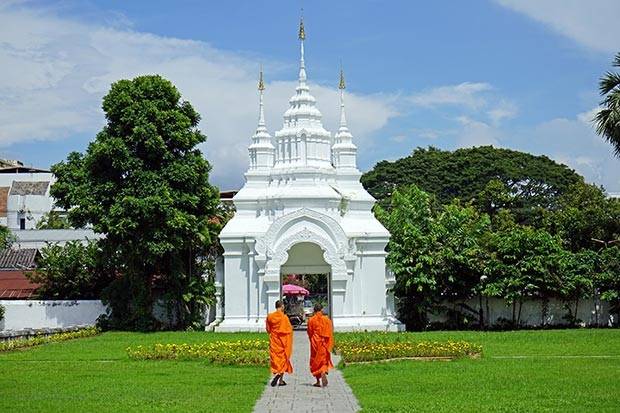
Thai manners for your trip
Let’s put the language aside to refer to other cultural aspects, to the pure customs and traditions of Thailand, which are good to know in order not to unwillingly annoy Thai people around us.
If you are familiar with these Thailand customs, you will get a better response from the Thais you interact with, and will avoid misunderstandings and problems that could give you a hard time. Pay attention to the following tips!
Don’t complain because not everyone can speak English
Yes, Thailand is a very touristy country and one of the most visited in the world. However, it is not an English-speaking country; it has its own language and people are proud of it.
Unsurprisingly, any complaint about the general (or specific) English language level in Thailand will only close doors for you, and it will be a barrier preventing you from discovering the real country beyond the landscape.
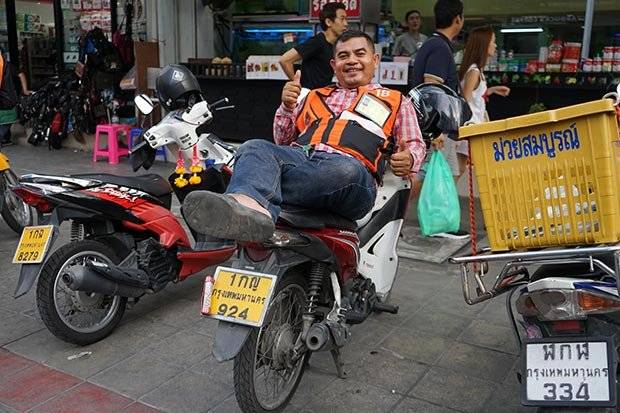
Let them know that you like their food… and if you don’t, better keep quiet!
Food is very important to Thais. They are very proud of Thai food, and really enjoy the act of eating. Thai gatherings usually involve a wide variety of Thai dishes with many different flavors. Therefore, if you tell them that Thai food is delicious, they will be very happy and will advise you to try local dishes that you probably have not heard of.
But if you don’t like local food, you better keep it to yourself. Besides the fact that no one likes to be told that the food they passionately love is bad, you would just be seen as another narrow-minded tourist
However, Thais will be very understanding if you tell them that you cannot eat spicy dishes. They are used to it, and it is rather a reason for amusement. Although, no doubt, if you like spicy they will be happier!
😙🚫 Avoid kissing in public
If you are traveling with your partner, don’t even think about kissing in a public space. No matter how romantic the place or moment may seem to you, kissing in public is frowned upon. You will notice that nobody in Thailand does, not even in series or movies. Kissing is reserved for privacy away from anyone else’s sight.
However, you can walk hand in hand with your partner, no problem with that. It goes without saying that you should avoid any attitude that may be considered unseemly.
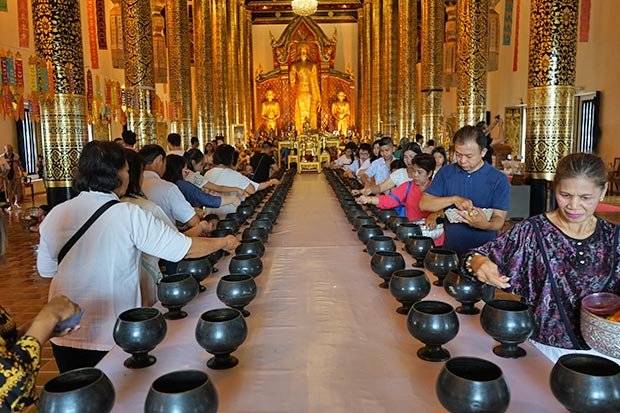
🙂 Don’t stop yourself from smiling
There is good reason why Thailand is often referred to as ‘The Land of Smiles’ in tourism campaigns. Thai people smile much more than the world average, and that gesture from you will be very well received by Thais. Smiling, along with a warm and respectful attitude, is a winning combination in Thailand. It is one of the customs of Thailand that will get you the best results with a very small effort.
🦶 Feet are not for pointing out things
One evening I was walking in a night market in Bangkok with my girlfriend (she is Thai). It was one of our first dates. We were thirsty so we stopped at a beverages stall where they sold iced tea and other soft drinks. A signpost hung from the counter at knee height, displaying pictures of the drinks available. My girlfriend asked me which one I wanted.
“That one” I replied, pointing with my left foot to a photograph of a milk tea glass.
For a couple of seconds she looked at me embarassed, like I just did something extremely rude, and she looked around hoping no one had noticed. When I noticed her reaction, I gave her the most tender look I managed to improvise. But I really had no clue about what I had done wrong!
She explained to me that feet are the most impure body part in Buddhist religion. They come into direct contact with the ground and its dirt, so pointing at things with your foot is considered rude, and is very frowned upon.
Therefore, pointing your feet at someone is also considered to be very disrespectful, according to the customs and traditions of Thailand.
👑 The figure of the king and the royal family
If you don’t live in a monarchy, it’s possible that the concept of ‘king’ rather makes you evoke fairy tales. Or maybe you live in a kingdom where it is accepted that both the king and the royal family are mocked by comedians and memes. In the case of Thailand, many aspects of the royal family resemble a fairy tale, but you better don’t make fun of them!
Thailand is a kingdom. And although the king in theory plays no part in politics and has only a symbolic role, law requires respect for the king and his family from both locals and foreigners.
In Thailand it is forbidden to speak ill of the king and other members of the royal family. There is a lese majeste law that punishes with very severe prison sentences for disrespecting the monarchy. The state media keeps making a big effort to pretend that virtually every ‘good’ Thai supports monarchy, although it is clearly not the case. So, unless they are effusively monarchical, what most Thais do is just avoid talking about it. In many settings, monarchy is a taboo subject.
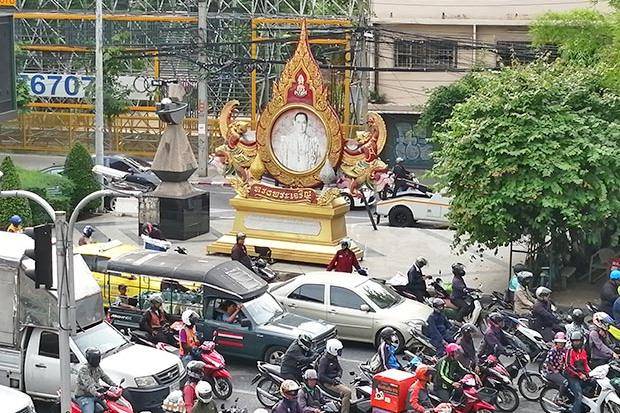
🇹🇭 Show respect when the national anthem is sung
This was something that took me by surprise when I first saw it. I was walking through Lumphini Park, a very beautiful urban park in Bangkok, where locals go to practice sports and sometimes you can see lovely huge lizards. People were running and exercising around me, when suddenly music began to blare through the speakers, with a melody that sounded familiar to me although I couldn’t identify it.
Suddenly everyone froze on the spot where they were standing at the same second that the music began to play. After taking a few steps while looking around me in bewilderment, I stood still. I saw some people look up to the sky, bringing their right hand to their chests. Others seemed to sing, or at least moved their lips following the lyrics.
The music lasted just over a minute, and right after it ended everyone went on with their activities.
The national anthem plays daily in public places at 8:00 a.m. and 6:00 p.m. You’ll experience something similar if you go to the cinema in Thailand. Before the beginning of every movie they play the national anthem, and everyone is expected to stand up to show respect.
🔮 Thailand is land of superstitions: Have a look at our article about 9 surprising Thai Superstitions and beliefs
Thai culture: visiting temples and interacting with monks
Visiting the temples is a must in Thailand. Buddhist temples captivate the traveler’s attention with their beautiful architecture and colorful decoration. If you have an interest in Buddhism, either as a religion or a philosophical tradition, visiting a temple and having the opportunity to speak with a monk will be a rewarding experience.

To visit a temple people must follow a few special rules, so when you visit these icons of Thai tradition and culture, keep the following in mind:
Clothing
When visiting a Thai temple you must wear appropriate clothing. Rules are a bit stricter for women than for men, but generally speaking:
- Long trousers or skirts that cover at least below the knees (long trousers/skirts covering down to the ankles are only mandatory in Bangkok’s Grand Palace).
- Covering your shoulders is preferable (again, only mandatory in the Grand Palace in Bangkok).
- Do not wear semi-transparent garments that allow to see the part of the body it is supposed to cover.
- Avoid plunging necklines.
- You will have to remove your footwear before entering the main areas (inside the enclosure).
Interaction with monks
Monks enjoy a special status in Thai culture. They are revered with great respect for leading a lifestyle that is undisturbed by worldly pleasures and sorrows. They have an important social role as spiritual guides, counselors and mediators to solve conflicts between members of their community, especially in small cities and towns.
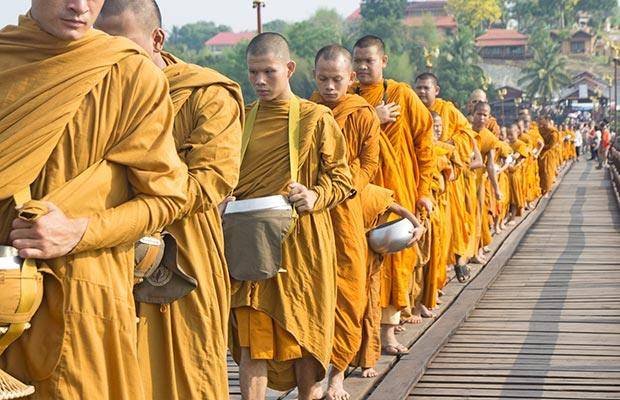
There are also exceptions, of course, and on many occasions monks have made headlines for their eccentric or fraudulent behaviors. Thais are well aware that all that glitters is not gold, and that it applies both to secular and monastic life.
In any case, the special role that Thai society reserves for monks means that, in general, monks receive a special treatment. You should keep in mind the following:
- Women cannot have any kind of physical contact with monks, and not even stay alone in a room with them (although it would be very strange for a tourist to find in such a situation).
- In general, men should also try to avoid touching the monk or his robe, or sitting very close to a monk. This is another of the customs and traditions of Thailand.
- In the temple, you should sit in a place that is lower than that occupied by a monk.
- On public transportation (although it is rather rare to see monks there), lay people are expected to offer their seats to any monk entering the vehicle/carriage.
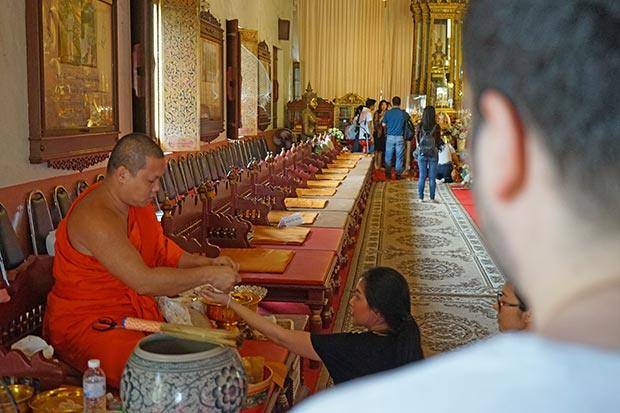
Respect Buddha images
For Thais, respect for the figure of Buddha is not only a cultural tradition, but in some cases it is even regulated and enforced by law.
No one with common sense will willingly disrespect the religiosity of the country he visits. However, ignorance of local customs could easily lead to involuntary offenses. Therefore, it is necessary to keep in mind:
- Buddha is not a decorative figure: therefore, buying a Buddha as a mere decoration is not allowed, and its decorative or disrespectful use can even be sanctioned. Well, at least this is the theory: you will see loads of Buddha figures offered in tourist markets, which is a bit contradictory. As a tourist, you might run into trouble if you try to exit Thailand with a Buddha figurine in your carry-on bag. If you put it in your checked baggage, there should be no problem.
- Buddha figures should never stand on the ground: they must be placed in a high place as a show of respect.
- Never climb on a Buddha figure or even its base or pedestal, even if you think you will miss out on taking the best photo of your trip.
- Don’t even consider getting a Buddha tattoo: since 2011 it is forbidden in Thailand to tattoo a Buddha on tourists, and doing so is illegal. In stricter countries like Myanmar they have even fired tourists for wearing Buddha tattoos.
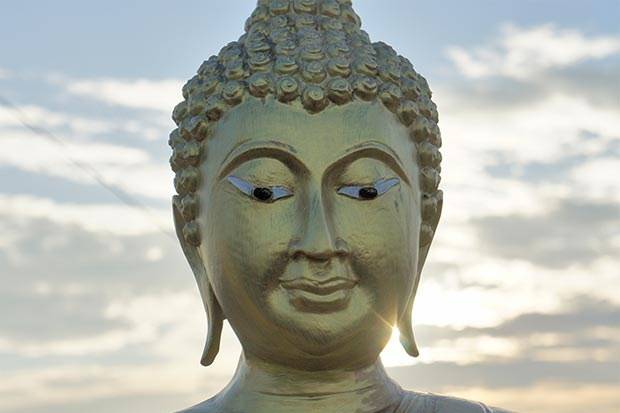
Are you interested in meditation? Have a look at our article in which a Spaniard nun narrates her experience doing a Vipassana meditation retreat in Northern Thailand.
Other Thai customs to take into account on your trip
🚇 When using the subway
I think taking the subway (MRT and BTS) was one of the things that surprised me the most in my first days in Bangkok. Specifically, the fact that people lined up to board the train even at rush hour.
It is extremely unusual to see someone in Bangkok trying to get into the carriage before whoever gets there first. When entering and leaving the station they also do it in this orderly manner, which facilitates movement on the platforms.
So, even if you’re in a rush, stick to the line. The train frequency is good, so you never have to wait for too long
🚬 If you are a smoker …
Smokers should be very careful while in Thailand, as the inhabitants of the land of smiles tend to be very sensitive to cigarette smoke, and many even detest it. For this reason, it is frowned upon to smoke on the streets near other people.
If you smoke, I recommend:
- Avoid smoking in outdoor bar/restaurant and other places where you are surrounded by people, or where pedestrians are walking. Always try to smoke away from other people so smoke does not reach them. Especially if there are children.
- In closed places smoking is generally not allowed (for example, indoors restaurants).
- Dispose properly of cigarette butts.
❌ Drug use is severely penalized
Beyond tobacco, alcohol and prescription drugs, Thailand laws don’t make a clear distinction between hard and soft drugs: punishment is always very harsh. If you are a marijuana user, it is advisable that you abstain while you are in Thailand, since its use (as well as any other drug) is severely penalized with long prison terms. Drugs are no joke in Thailand, and can get you in serious trouble.
These are some rules of behavior and customs of Thailand to keep in mind while traveling around the country. They will help you enjoy Thailand without getting into unnecessary trouble!




